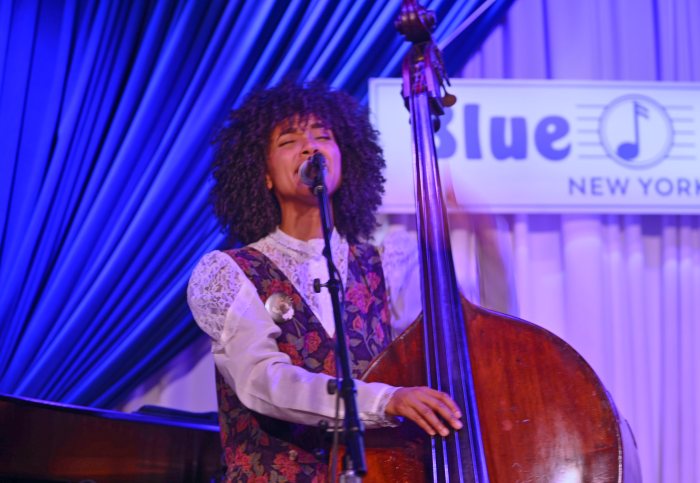The adage is write what you know, but for Nia DaCosta’s debut feature film, "Little Woods" is quite a departure from her New York City roots. Starring Tessa Thompson and Lily James as two sisters struggling through various crises in an oil boomtown, the native Brooklynite chose to explore real issues plaguing many Americans, specifically those unseen stories in North Dakota.
"I was engaging with women who live in different parts of the country and particularly women who would be affected by the changes in health care and the limited access to Planned Parenthood or women’s clinics," DaCosta explains. "As a New Yorker, I have so much access, in the physical sense, but also because I live in a progressive city. My means stretch further in a place like New York, whereas when you’re in a rural part of America, there’s that isolation. They are the ones hit hardest by this legislation."
We spoke with DaCosta about "Little Woods," which hits theaters Friday, and the upcoming Jordan Peele-produced "Candyman," which she is set to direct.
How has New York shaped your filmmaking career thus far?
It was my first experience with formal education in film. I went to Tisch at NYU, and that’s truly a conservatory. We shot on film in my second year, which is amazing. In my third year, I went to Prague and shot on 35 mm film. And so there was so much that was tactile and immediate. Also just facilitating how to get all the ideas in your head, onto the screen.
"Little Woods" made its premiere at Tribeca Film Festival last year, and for it you were awarded he Nora Ephron award. How was that whole experience?
The thing about Tribeca is, I’m from New York, so I’ve been going to Tribeca for years. So it was really nice to have positive feedback at my own hometown film festival. It just feels really nice to be supported by festivals, especially for indie films because that’s the way we get seen and get sold.
Not many women, especially women of color, get the chance to make a feature film and have it distributed. What were some of those early obstacles?
I acknowledge the amount of women, and women of color, black women in particular, who paved the way for this and who effected so much change so that I could have a relatively easy time. I will say the hardest part about it, and I’ve experienced thus far, is the small ways in which you’re sort of undermined. So part of it is yourself not trusting yourself, ’cause you’ve kind of been socialized as a woman — as a woman of color, in particular — to doubt who you are and where you are and to have impostor syndrome to such a degree.
On the flip side though, we also get fed a diet of "you have to work twice as hard to get half as far" and I think that’s helped me in life because I’ve definitely worked twice as hard and I think that’s really helped to get me where I am. But also you just get less money to do the things you want to do and to tell the stories you want to tell. That’s just a fact.

You have these two powerhouse performances from Tessa Thompson and Lily James. How was your experience working with them on your first feature?
It was amazing. Tess has been on the project since 2015 — we met at the Sundance Directors Lab. … With Lily, she came on when we were in prep and I’d seen her on stage when I lived in London and I thought there’s a darkness in this person and I’d really love to exploit it [laughs] which I told her, and I think terrified her, but I think it’s also the reason why she wanted to do the project.
There’s this unique relationship where the sisters are tethered but also painfully frayed. Did you give your actors room to develop that relationship?
Oh yeah, 100%. We had a lot of conversations. Tess and I, we both have sisters, younger sisters, and are both the oldest. [Siblings] are tethered to each other, but we’re all so different. My friend had an interesting theory. She said the reason why siblings are so different is so that we learn how to empathize with people who are unlike ourselves. I think that’s a big thing with Tessa and Lily’s characters. They’re in each other’s lives and they love each other and they have to learn how to reconcile their differences within that.
Speaking of tethering, you’re working with Jordan Peele next with “Candyman." That was such a huge cult horror film in the ’90s. How did that project come to be?
It was super straightforward. I basically pitched for it. Jordan decided that I was the best person for the job. I think we just really connected. We have a lot of the same references when it comes to horror.
What is it about "Candyman" that made you want to take this on as a sequel?
I love "Candyman." Being a horror fan in the ’90s, when I was way too young to be watching most of those films. It’s in the firmament of our culture, especially as a black person. I mean, the movie has its issues from 1992, so there are some things you’ll say "oh, we wouldn’t do that today." But I think that’s what’s exciting about being able to make the spiritual sequel. Who is he and what does Candyman today look like?
It’s a 180 from "Little Woods," most notably it’s a bigger scale film. How has that been?
I’m really excited about that. It’s exactly what I want to do next. I couldn’t have found a better collaborator than Jordan Peele and the entire Monkeypaw [production] team. So I’m super, super excited.





































